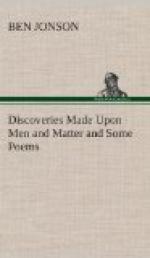De Princ. adjunctis.—Sed vere prudens haud concipi possit Princeps, nisi simul et bonus.—Lycurgus.—Sylla.—Lysander.—Cyrus.—Wise is rather the attribute of a prince than learned or good. The learned man profits others rather than himself; the good man rather himself than others; but the prince commands others, and doth himself.
The wise Lycurgus gave no law but what himself kept. Sylla and Lysander did not so; the one living extremely dissolute himself, enforced frugality by the laws; the other permitted those licenses to others which himself abstained from. But the prince’s prudence is his chief art and safety. In his counsels and deliberations he foresees the future times: in the equity of his judgment he hath remembrance of the past, and knowledge of what is to be done or avoided for the present. Hence the Persians gave out their Cyrus to have been nursed by a bitch, a creature to encounter it, as of sagacity to seek out good; showing that wisdom may accompany fortitude, or it leaves to be, and puts on the name of rashness.
De malign. studentium.—There be some men are born only to suck out the poison of books: Habent venenum pro victu; imo, pro deliciis. {66a} And such are they that only relish the obscene and foul things in poets, which makes the profession taxed. But by whom? Men that watch for it; and, had they not had this hint, are so unjust valuers of letters as they think no learning good but what brings in gain. It shows they themselves would never have been of the professions they are but for the profits and fees. But if another learning, well used, can instruct to good life, inform manners, no less persuade and lead men than they threaten and compel, and have no reward, is it therefore the worst study? I could never think the study of wisdom confined only to the philosopher, or of piety to the divine, or of state to the politic; but that he which can feign a commonwealth (which is the poet) can govern it with counsels, strengthen it with laws, correct it with judgments, inform it with religion and morals, is all these. We do not require in him mere elocution, or an excellent faculty in verse, but the exact knowledge of all virtues and their contraries, with ability to render the one loved, the other hated, by his proper embattling them. The philosophers did insolently, to challenge only to themselves that which the greatest generals and gravest counsellors never durst. For such had rather do than promise the best things.
Controvers. scriptores.—More Andabatarum qui clausis oculis pugnant.—Some controverters in divinity are like swaggerers in a tavern that catch that which stands next them, the candlestick or pots; turn everything into a weapon: ofttimes they fight blindfold, and both beat the air. The one milks a he-goat, the other holds under a sieve. Their arguments are as fluxive as liquor spilt upon a table, which with your finger you may drain as you will. Such controversies or disputations (carried with more labour than profit) are odious; where most times the truth is lost in the midst or left untouched. And the fruit of their fight is, that they spit one upon another, and are both defiled. These fencers in religion I like not.




